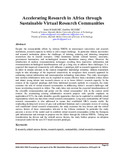| dc.description.abstract | Despite the commendable efforts by African NRENs to interconnect universities and research
institutions, research capacity in Africa is still a major challenge. In particular African universities
and research institutions phases the challenges of training, retaining and attracting competent
researchers due to limited resources. Other limitations include cultural barriers, insecurity,
government bureaucracy and technological resource limitations among others. However the
introduction of modern communications techniques resulting from innovative information and
communication technological transformations will go a long way to address these challenges. It is
expected that improved connectivity will influence a paradigm shift in research approach in Africa.
In order to remain relevant in the current competitive knowledge economy, African researchers
ought to take advantage of the improved connectivity to reengineer their research approach by
embracing current information and communication technology innovations. This study investigates
how modern collaborative tools can be exploited to ensure effective brain circulation within Africa
and attract young talents into research careers so as to boost Africa’s research capacity. In the
context of the expected paradigm shift from traditional research methods to e-research, the study
examines the role of virtual research communities in addressing Africa’s research challenges and
hence accelerating research in Africa. The study takes into account the expected transformations of
the scientific communication and points out the virtual communities’ role in the current social
context. By scrutinizing existing collaborative research projects with specific emphasis on
application of ICTs, the study identifies specific approaches that can be exploited to establish virtual
organizations which can then form virtual research communities. Long term sustainability of Virtual
research communities is also addressed to ensure that established VRCs remain viable. By
conducting desktop/web review of grey and published literature and a systematic review of existing
well established virtual research communities, the study examines the key drivers and the critical
success factors of these communities relevant to the African continent. In particular the study
presents a review of the model used to establish virtual research communities within the European
grid infrastructure and attempts to propose one for Africa through the African NRENs. Taking into
consideration the drivers and the critical success factors, the study further proposes an adoption
conceptual model for the new ICT based research paradigm. | en_US |

